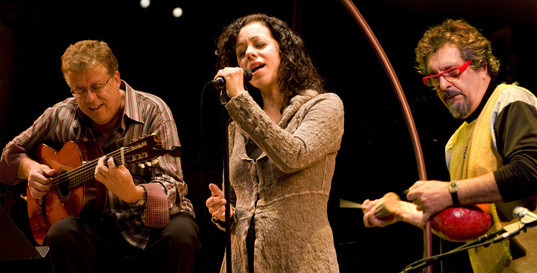Luciana Souza bringing Brazilian-inspired sounds to Rackham
For Brazilian singer and composer Luciana Souza, geography and language have been 2 of the most important driving forces in her life.
Geography, because Souza was born and raised in São Paulo, Brazil, but then left home when she was just 17 to study music in Boston. She later spent a decade making a name for herself in the jazz scene in New York. And then, several years ago, she moved to Los Angeles. So, she says, “I’ve had feelings of being uprooted, and disoriented, even as I have also aspired to being centered and calm.”
And the poetry? “Poetry and music have helped me to find that center, and that calm, and have carried me throughout the years — along with love, of course,” says Souza, who brings her trio to Rackham Auditorium on Thursday, Feb. 11 for a show sponsored by the University Musical Society. Her trio includes Romero Lubambo on guitar and Cyro Baptista on percussion.

The Luciana Souza Trio performs at Rackham Auditorium on Thursday.
Luciana Souza, now in her late 40s, explores some of those feelings — along with the pull of nostalgia — on her latest album, “Tide,” which was nominated for a Grammy for Best Jazz Vocal Album.
It was produced by Larry Klein, the über-producer and bassist who is also her husband — and who was married to Joni Mitchell for many years in the ‘80s and ‘90s, producing several of Mitchell’s records between the early ‘80s and early ‘00s. This is Souza’s second collaboration with Klein, whom she married in 2006. And in some respects, a few tracks on “Tide” recall some of Mitchell’s jazzier, Klein-produced albums.
Luciana Souza talks about “Tide”: The big difference, of course, is the Brazilian music component. Souza’s mix of Brazilian and jazz styles is alternately slinky, sultry, pastoral and breezy, often punctuated by the undulating bossa nova groove that surrounded her when she was growing up in a family that included several bossa nova composers.
PREVIEW |
The sense of nostalgia that made its way into some of the songs on “Tide” is something Souza has been experiencing in her personal life the last couple of years.
“During the time I was preparing and then making this record, I experienced 3 very emotional events,” says Souza by phone from her home in Los Angeles. “In a 9-month period in '08 and '09, both of my parents died. But, in between those losses, I had a baby. So in that span, I had these 2 tragic events, but also this blessed experience of giving birth.
“And I hadn’t seen my folks much in the previous few years, due to living abroad, and with them still being back in Brazil. So, it was all very emotionally unsettling. And, since Brazil is my native country, I began thinking a lot about my past — my childhood, my time with my parents, and Brazil in general.
“I think anyone who has lived away from their native country for as long as I have has those feelings — they carry that with them. I try to be calm here, and center myself, but there is always that gravitational pull. Because, even though I am comfortable here, and consider this my home, your native country is still a big part of your identity.”

So, with all of that in mind, Souza kicked off “Tide” with the Brazilian song, “Eu Quero um Samba,” which is more or less the anthem for Brazilian expatriates who are living abroad but wish to go back home. The song was written by Geraldo Jacques from the point of view of a Brazilian who is so homesick that he hears the samba calling his name.
Souza and Klein infuse the track with a fittingly syncopated Brazilian groove, while Souza uses her winsome voice to emotively convey that sense of longing.
“What is important about that song, though, is that there is also some humor in it — and that, at the end, the singer knows he or she can’t go back, because it’s been so long, and so many changes have occurred, that the country they remember really doesn’t exist any more,” ponders Souza. Listen to Luciana Souza “Adeus América/Eu Quero um Samba” (MP3).
A few tracks on “Tide” are original compositions, co-written by Souza and Klein, along with collaborator David Batteau.
She says the collaborative process between she and her husband-producer is “very spontaneous. He’s obviously a very experienced producer, and I have a lot of reverence for his knowledge, because he’s worked with so many artists over the years (Mitchell, Shawn Colvin, Tracy Chapman, Herbie Hancock, Walter Becker and Madeleine Peyroux among them). And he’s very good at drawing from you what your vision is.”
It’s also a good synergy, she says, “with me coming from bossa nova, Brazilian folk music, plus jazz, and him being so deep into jazz and rock.”
On a few other tracks, Souza takes the poetry of e.e. cummings and sets it to music. Souza has demonstrated her facility with such adaptations in the past, having used the poems of Elizabeth Bishop and Pablo Neruda as her lyrical “source material.”
“I’ve been reading the poems of cummings for many years, going back to when I was a teenager in Brazil, because his poems were in some of the poetry anthologies we had,” she recalls. “There is something about his work that speaks to me, even though it is not my native language.
“But, in a way, his poems almost sound as though they were written by a ‘foreigner,’ with his use of double negatives, and in the way he combines words, which is often a ‘mistake,’ in that technically, is grammatically incorrect. There is something about that that makes you realize there is a deeper meaning.”
Although she was immersed in bossa nova as a child, and many of her memories of her father are of him playing samba and bossa nova music on the guitar, Souza also boasts some serious jazz composition chops — which she learned at 2 of the best music schools in the country — Berklee College of Music and the New England Conservatory of Music.
So, she says that, to this day, she draws equally from both idioms when creating her own music. “I’m not really one to define what I do, but I’m also not trying to defy any labels. I’ve been given a lot of opportunities, and when people call me for a project, I will do it if it doesn’t seem too far-fetched.
“The music of Brazil is so rhythmic, and my jazz studies gave me a deep knowledge of harmony. So I like to think that the music I that make draws from the best of those traditions that I have embraced for most of my life.”
Kevin Ransom is a free-lance writer who covers music for AnnArbor.com. He can be reached at KevinRansom10@aol.com.

